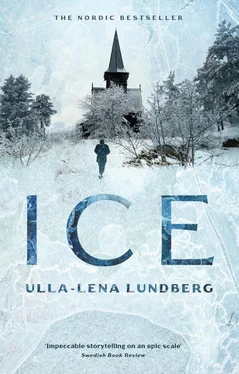“What’s wrong?” Mona mumbles.
“Nothing,” he answers. “Everything’s fine. Sorry I woke you.” He sleeps again a little, and when he finally sleeps deeply, the alarm clock goes off. He jumps up as if it were an air raid warning, but sinks back down when he realizes where he is. Still pitch-black, but he smells Mona’s good scent as she gets out of bed. He hears the rasp of the match on the matchbox and then she lights the lamp. They listen—complete quiet. When she gets to the kitchen, Mona suddenly screams and Petter rushes out to her with his trousers at half-mast. It’s nothing. For an instant she thought that the church was in flames, but there is a light in the sacristy window simply because the verger is there to build a fire in the boiler, which is one of his duties.
At least someone believes there will be a Christmas morning service. They’ve thought about how they’ll do this. The simplest would be for Mona to stay at home and fire up the stoves and make breakfast, but Christmas morning is one of the high points of the church year. It’s not a long service, so they’ll have time to build fires and have breakfast at almost the normal time when they get back. Now they have just a cup of last night’s coffee from the Thermos and a quick sandwich. Then Petter goes off to the church while Mona dresses Sanna and Lillus and follows after.
The verger meets him at the church door, expecting praise and getting it, profusely. The bulging radiators in the church are banging away, and the church is getting warm. With every minute that passes, the air is a little less raw. “My dear fellow,” says the pastor, “what time did you get here?” “Four o’clock,” says the verger proudly. This is his big night of the year, when he overcomes his fear of the dark and can calmly proclaim that the dead do not celebrate Christmas Mass at midnight, at least not in Örland church. The pastor reports that he himself was up at two o’clock and the storm was still raging. Then it calmed quickly. “But my goodness the size of those seas!” “Yes, it takes a time for the surf to settle.” They talk quietly as they prepare the church. They had the candles ready back at the beginning of Advent, and two potted tulips stand on the altar. The verger has posted the first hymns on the number board. Now they light all the candles, on the chandeliers, on the altar, on the pulpit. The church is to shine like a lantern as the congregation approaches. While they’re at it, the organist comes running in and takes the pastor by the arm.
“Come! You’ve got to see this!”
The Örland congregation is coming towards them across the hills. The seas are too high for anyone to want to come by boat in the dark. So they’ve started early from all the villages and now they can be seen in a long row of blinking, swinging lanterns descending the last slope. The verger runs to the steeple, for the bells must ring as they approach, the big bell and the small one tolling for all they’re worth.
The organist warms his hands on a radiator, and the pastor hurries to the sacristy. The first to come in fill the church with footsteps and noise, rustling and shuffling. “Merry Christmas!” they wish one another in their strong, Örland voices. The long walk with swinging lanterns, watching their step on the slippery rocks, has made them bright and talkative. But then the voices change and grow rapid and frightened, and soon the organist comes into the sacristy. “You need to hear this before we start.”
It seems one of the last to arrive is a ship’s pilot from the west villages who has heard on the pilots’ radio that a large American freighter has gone aground and sunk off the island of Utö. The pilots on Utö have rescued many of the crew, but a number of them are missing. “Many of us had a bad feeling last night,” he adds, understandably enough.
“Thank you,” the pastor says. “I’m glad you told me. I’ll say a prayer for them.” He looks at the clock and sees that it’s past time. Mona is sitting in the church wondering why they don’t start. The verger stopped ringing the bells some time ago. But now the organist hurries to the loft, the organ pumper starts to work, and the organist begins playing the opening bars of “When Christmas Morn is Dawning”—a little too fast.
The whole church is glowing in its Egyptian darkness and the talking dies down reluctantly. When the organist indicates that the hymn is now beginning, they are ready. It is one of their favourite hymns, which they’ve waited all year to sing, but now they’re distracted, the dissonances are unexpectedly great, the bellowing more distinct, the differences of tempo more audible. The pastor is at the altar, singing as he always does, but not happy, horrified, as is everyone who’s already heard the news. “The Lord be with you,” he sings, as usual, and Lillus answers happily a little ahead of everyone else. Anyone would be inspired in these wonderful acoustics, and the pastor takes them through the liturgical embroidery and through the lesson. When they sing “Starlight on Sea and Sand”, there are people talking out loud in the back rows, and many in the front pews turn around. In the loft, where the younger boys have gathered, they talk and run around without restraint.
No calm, no collective expectation when the pastor climbs into the pulpit. “Dear friends, brothers and sisters in Jesus Christ,” he begins as usual. “Let us pray.” The older people obediently bow their heads and then everyone listens, for now the pastor will give them the information that led to all the hubbub. “This night, on Christmas night itself, the whole crew of a freighter has been fighting for their lives in the storm off Utö. We thank you for the pilots on Utö, who put their own lives in danger to rescue many. We pray for those who have lost their lives at sea. God, be merciful to them and receive them into your fatherly embrace. Let the light eternal shine for them. Amen.”
After this, it’s easy to return to the subject of light, the church lit up for celebration, for the feast of our Saviour’s birth, but also to the light in the bell tower that faithfully and steadily blinked all through the storm-lashed night. And on to the Star of Bethlehem that wandered through the night and led shepherds and wise men to the stable and the manger. We ourselves surrounded by deep darkness, but in the centre a light that guides us from age to age. The light is Christian hope, personified in the body of Christ, which is a lantern to guide our steps and light up our path. In the silence that follows, everyone can clearly hear a foot colliding gently with a storm lantern on the floor, a little clinking that jingles through the church. The candle flames flutter in a draught, no one misses the parallel with their own trek with swinging lanterns through the deep darkness towards the shining church.
They sing “Lo, How a Rose E’er Blooming from Tender Stem Hath Sprung!” while the pastor changes his robe and returns to the altar. In his closing prayer he prays especially for all those struggling at sea, then the Our Father and the blessing. Finally, Topelius’s “I Seek No Gold or Majesty, No Pearl or Shining Gem”. The organist is about to begin his postlude, his showpiece, but the organ pumper is facing the other way, talking to someone, and people are already standing up in their pews and talking loudly. When the organist finally starts playing, they just talk louder. The pastor takes off his vestments quickly and the verger is back in the church before the postlude is over. As soon as he’s finished, the organist leaves his music on the organ and comes down to the others. In the middle is Anders Stark, the pilot who heard the news on his radio. He’s in a hurry to get home to hear more news, but repeats what he knows once again: The freighter is called Park Victory, a big devil, oh, beg pardon, and he himself was her pilot once. From the American South, lots of Negroes and such people. A crew of at least twenty-five. The pilots on Utö have rescued at least half, they think. The ones still out there haven’t got a chance. The Coast Guard has been out all night but has no hope of finding anyone else alive.
Читать дальше












